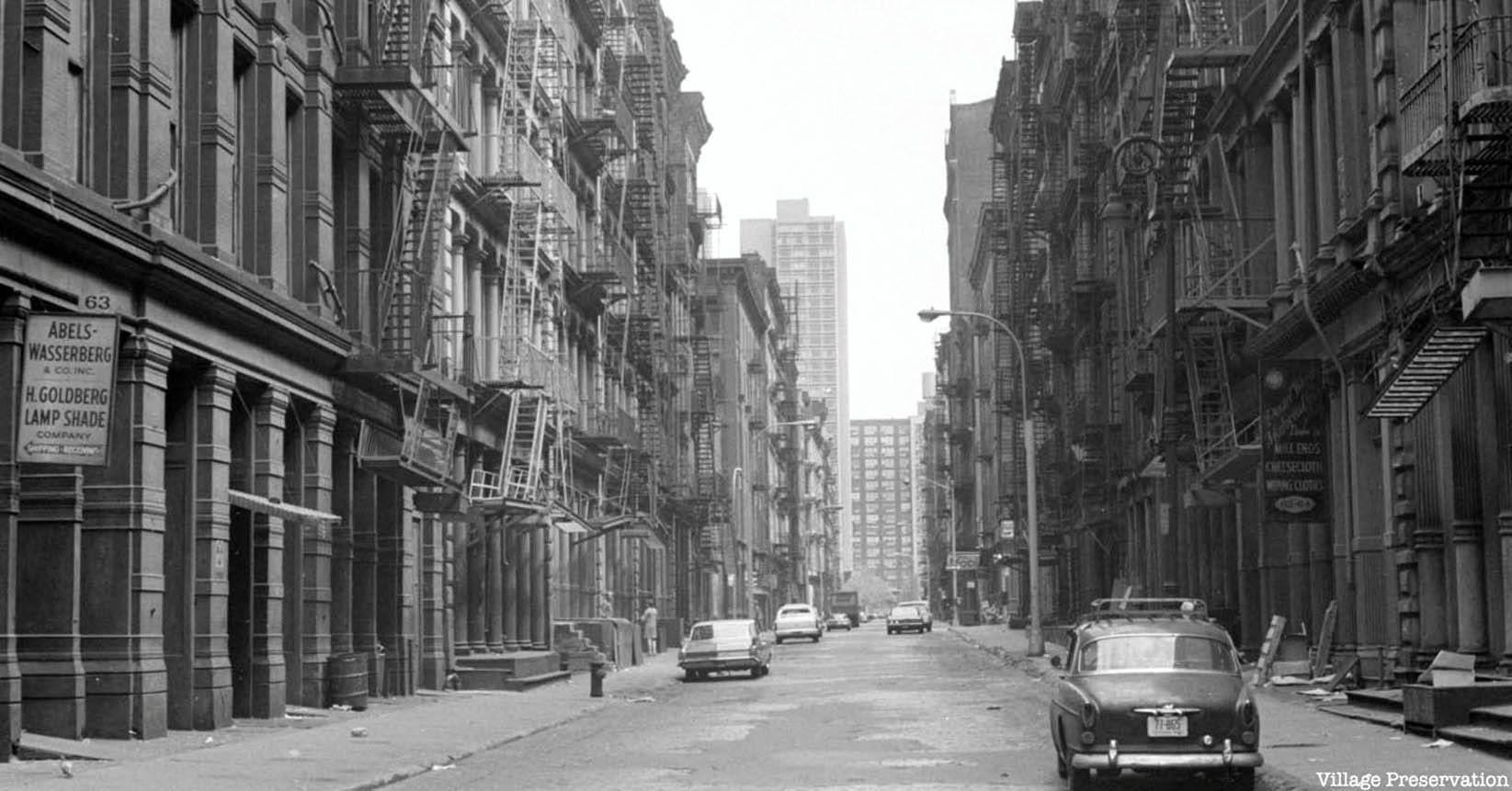Culturewatch
Fiesta
For a long time I used to get up early on the day of the Annual Anti-Gentrification Street Festival. I’d join the crew that set up traffic barricades on Claremont, Broadway and Riverside and lug tables from International House—the dorm for foreign students on Claremont—down to Tiemann Place. I’ve tended to flake off lately though. My nephew Jamie and his gen seemed to have taken on the job after my brother Tom died—retiring elders like me. Yet this September I’d been more involved in prep since we’d arranged with our Councilman’s office and the DOT to schedule the “unveiling” of an official sign co-naming Tiemann Place “Tom DeMott Way” on Festival day.
Thanks to a prompt I could not refuse from an Irishwoman, Anah Klate, on September 16th I was up and out on the street by mid-morn (as grey went blue).
Emily Rose

This photo graces the cover of Bruce Jackson’s new book of essays, Ephemera 1995-2022. Don’t be fooled by the self-diminishing title. Jackson’s dog earned her paper monument…
Upside Down
Thinking of Mikhail Bakhtin
Saint Peter has grown horns,
and Dionysius, wears Italian moccasins.
Peasant are crowned, and kings revel
in shovelling manure.
Roots & Stem
Sparing you the seconds of time speeding by as the Pentagon’s unauditable bloated budget speeds us toward dead oceans, dead corals and a million species lost…
laughter makes you smarter (redux with Phil Greene & Robert Hunter)
Your editor realized it was dumb not to have put the vid of these Kenyan kids up top when I posted Charlie Keil’s poem (which they helped spark) so…
ted talks this morning one on laughter makes you smarter
another by 93-year old fitness freak got a few yucks
then I went to Drum & Dance Kenyan Children**
Men in Sand
Unlike Andrew Holleran’s previous beautiful, vital fictions gracing gay men’s stories over the decades — Nights in Aruba, The Beauty of Men, Dancer from the Dance — Kingdom of Sand is an unfortunate late coming wrawl of self-indulgent sadness.
“Little Women,” “The Pilgrim’s Progress,” and America’s Progress
The absolute favorite books of my childhood were strictly for boys, written by Alexandre Dumas, the author of The Three Musketeers and its numerous sequels, which I devoured, or by James Fenimore Cooper, the author of The Last of the Mohicans and its own sequels, which likewise I devoured. Little Women by Louisa May Alcott, was, by contrast, strictly for girls. I knew this because, unlike the works of Dumas and Cooper, which sat on my own shelves, Little Women sat on my sister’s shelves, together with other works by Alcott. But there was no bar to my taking a peak, and the illustrations enticed me, and the pages turned, and somehow I devoured Little Women, too.
Brother Minds: Kafka and Obama
The nausea produced by Trump’s “alternative facts”—which are neither facts nor viable alternatives to facts, being merely lies–has led to a good deal of finger-pointing. Is the seeming legitimacy of such lies owed to advanced (post-modern, “post-truth”) literary theory? For, here, it’s said, readings for the truth of complex texts result in nothing more than a vertigo of indetermination. We have no decisive outcomes but only different hypotheses, having unfathomable degrees of validity, that vie for primacy with no end in sight. It’s not my remit to do a history of the concept of truth-skepticism, but we did not need Foucault and Derrida to introduce us to this great negation. There are paramount exemplars of such concerns in German thought, from at least the 18th century on: Doubts about the accessibility of truth abound, but they are not given equivalent status with lies. The polymath G. E. Lessing acknowledged “the diligent drive for Truth, albeit with the proviso that I would always and forever err in the process.”[1] We have a kind of modern radicalization in Kafka’s skepticism: “A certain [kind of] truth might be found only in the chorus … or choir (im Chor) (emphasis added).[2] Bottom line: we did not need to be vexed by literary theory to declare that “alternative facts” may not be turned into a chorus of part-truth viewpoints and opinions.
As we return finally to another anthropological order, we find the suggestion that criticizing Trump “for not being consistent, reliable, or rational is to misunderstand his leadership philosophy.” Is that true? I’d aver that he has no detectable “philosophy,” unless it’s to have none. By contrast, it’s tempting to invoke, as possibly redeeming, the mind of another ex-President: Barack Hussein Obama.
Crystallize It

A mind so fine no idea could violate it? Midway through Tori et Lokita – the Dardenne Brother’s latest film – there’s a sequence that brings home the flaw in T.S. Eliot’s noble praise-line. The Dardennes crystallize an idea that’s suffused with feeling. What happens on screen isn’t a reduction or an abstraction or a violation. It’s an act of imagination.
Meetings With Remarkable Men
In 1965 my parents bought a house in Longport, on the opposite end of Absecon Island from Atlantic City. Longport, which was then still called “The Irish Riviera,” was across a causeway from Ocean City, another (Gentile) family-oriented South Jersey vacation spot. Ocean City was dry, but next to it was Somer’s Point, a veritable Bourbon Street to its Riyadh. My favorite Somer’s Point joint was Tony Mart’s because a highschool classmate of Max Garden’s tended bar there and let us drink for free.
Tony Mart’s booked rock’n’roll bands, and I knew from the subsequent literature that The Hawks played there before they became The Band, and I wondered if I’d heard them. Robbie Robertson’s passing triggered a lot of FB postings, and I learned that The Hawks were at Tony Mart’s the entire summer of ‘65. In fact, Robertson took Bob Dylan’s phone call inviting the group to New York in its kitchen. So I heard them once? twice? three times?
And they made absolutely no impression on me.
Talk about an eye (or ear) for talent.
Night Within the Night
[excerpts from Last Beauty of the Earth, a work in progress]
..One can be almost certain that the inflationary horniness among older millennials and Gen Xers, along with the constant mainstream jeremiads about the decline of sex, the inexorable draining of sexuality from the world (echoes of Hölderlin’s withdrawal of the gods), is revanchist, and prefigures either a fascist future of universal eugenics and Lebensborn programs, devoted to the sexual enslavement of the species, or a near-future, closer than one might expect, in which fucking has been abolished, or faded away, along with the money system, labor, the male sex, etc., all that shit Valerie Solanas wrote about. In the meantime, a spiritual disciple of Cronenberg, I carve my anima into my very flesh, I tattoo my name in Hebrew on my neck, Leila, לילה, daughter of the night, goddess of sex and the transmigration of souls, eternal flower and mirror, who is also the agent of the return to oblivion, to forgetfulness, to the unmaking of the flesh: time itself.
The Unfinished Revolution of “The Joy of Sex”
The sexual revolution may have reached its high-water mark 50 years ago, the week of August 5, 1973, when The Joy of Sex: A Cordon Bleu Guide to Lovemaking first topped the New York Times list of nonfiction hardcover best sellers. Published the previous fall, the book had swiftly become a publishing phenomenon. For the first time, anyone in America could walk into a respectable bookshop and openly purchase a detailed, illustrated sex manual: a modern version of the guidebooks that Indian aristocrats, Chinese mandarins, and Florentine grandees had consulted centuries before.
Burning for You

‘Kitchen Fire’, 2023, oil on linen, 24 x 18 inches.
I’ve had an ongoing series of paintings about lovemaking that pop up every now and then. Depicting intimacy in a way that is a tad voyeuristic yet never prurient is challenging, but I find that it works when the moment is somehow eclipsed by the periphery of life lived.
Hells and Benefits (Benjamin DeMott on Sexology in the Seventies)
Originally published in The Atlantic in 1975.
Are sexologists dumb? I’ll admit that’s an impolite question—and I’ll also admit that a little of my skepticism of the sexological tribe stems from irrelevant literary fastidiousness. Sex researchers and commentators sooner or later “bring in” a poet or two to decorate or amplify their arguments, and depressingly often, they misquote what they’ve appropriated or otherwise deface it. (One recent volume includes the following remark: . . [we] realize that, in a paraphrase of John Donne, the unsatisfied metaneeds of any group within a community weaken that community and reduce the chances of all its members of reaching their full potential.” Of what in hell could these words be a paraphrase?)
R.I.P. to a Man’s Man
On Cunningham Street in the Upper Brickyard of Clarksdale, Mississippi, Clement Edmond was a man’s man—respected and beloved by all as a bedrock of his community. He reminded me of my pops in his ability to express every aspect of what it means to be a leader and fully human. He was a traditional husband who worked while his wonderful wife, Louise, kept a safe and loving home for their thirteen children.
Seventy-five cents okay with you?
 Green Street in 1969
Green Street in 1969
The first loft I lived in was on the north side of Broome Street, between Crosby and Lafayette. I sublet it for the summer of 1969 from an artist by the name of Jack Whitten.
Danny Lyon, Journey West
This short film was made on the occasion of this summer’s ABQ Museum show, Danny Lyon – Journey West.
A True Pro-Life Movement Has Never Been Tried
In Ohio, this Tuesday, voters in a special election will decide on a scammy state constitutional amendment. “Are you sick of constitutional amendments? Vote yes on Issue 1 and you won’t have to put up with them anymore!” Issue 1 makes the process of amending our state constitution significantly harder. Since 1851, proposed amendments to our constitution needed a simple majority to pass. Issue 1 would up the required majority to 60%. If you take supporters’ word for it, shadowy interest groups from outside the state have set their eyes on Ohio and our big, beautiful constitution. “They” seek to shred it so as to turn us into another Democratic shithole like Chicago or California. We need a special instance of living constitutionalism to protect the original intent of the constitution (or something).
The Death of the Aryan Race
..A Verso article on the “downtown scene,” the fascist avant-garde, Yarvin and BAP, etc. I’ve been making “aesthetically alive art out of history’s flotsam” for years that takes in real brutality, not the overwrought racial/gendered disgust these people have at the symptoms of capitalism, but the mandarin left would rather talk about a bunch of liberal art school kids and failed models cosplaying fascism than look for anything genuinely new.
Yard Politics
Four days a week, I wake at 4:50 a.m. and start my exercise routine. Thursday is the only day that I don’t exercise. I still wake at 4:50 a.m., but I mow the yard and wash both cars. I’ve been doing that since I was in my twenties, when I was renting a house before I purchased my own home. The Thursday routine was instilled in me by my pops who always cut his yard on Thursday, mostly because his work as a juvenile youth counselor and a member of the Mississippi Democrat Executive Committee meant that his weekends were too busy for yard work. However, the notion that mowing one’s yard and maintaining one’s home is a primary responsibility of a citizen was instilled in me from the womb by my pops, grandpops, and just about every person in my Clarksdale and Jackson communities.